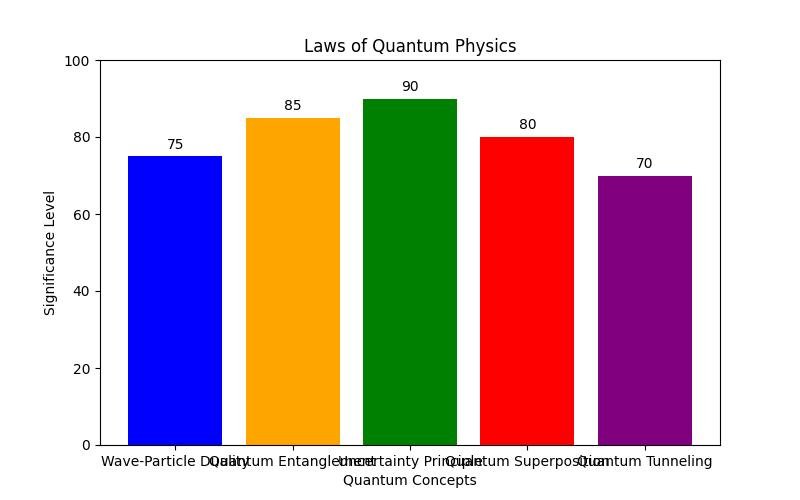What Is Quantum Physics?
Ah, quantum physics. Just the mention of it conjures up visions of eccentric scientists scribbling equations on blackboards, particles behaving in ways that defy our everyday logic, and a world so small that it seems more like a bizarre dimension from science fiction than a reality underpinning our universe. But what if I told you that understanding quantum physics is not just for the Einstein-level intellects among us? In fact, it forms the very backbone of the technology we rely on every day, from the screens you’re reading this on to the GPS in your car. So, let’s dive into the quantum world and unravel its mysteries, one particle at a time.
Understanding the Quantum World
Discover the foundational concepts of the quantum world and how they relate to our understanding of physics.
– Quantum physics describes the behavior of matter and energy at the smallest scales, revealing a realm where particles can exist in multiple states simultaneously.
– The quantum realm operates on principles such as superposition and entanglement, which differ significantly from classical physics principles.
– Quantum physics is essential for advancements in technology, influencing fields like computing, cryptography, and even our understanding of the universe.
Quantum Physics Definition
Quantum physics is the branch of science that deals with the behavior of the smallest particles in the universe. These particles include electrons, protons, neutrons, and even smaller entities like quarks and gluons. At its core, quantum physics seeks to understand how these particles interact and form the building blocks of everything we see and touch. Unlike classical physics, which describes the macroscopic world with predictability and precision, quantum physics introduces a level of uncertainty and probability.

Insider Tip: Dr. Lisa Randall, a theoretical physicist, suggests imagining quantum physics as a game where the rules are constantly changing, and yet, in its chaos, there is a beautiful symmetry.
What Is Quantum Physics?
Quantum physics is not just a set of theories; it’s a new way of thinking about reality. When people ask, “What is quantum physics?” they’re often curious about how it fundamentally differs from what we know as classical physics. Classical physics, governed by Newton’s laws, deals with the macroscopic worldobjects we can see and touch. Quantum physics, however, is the science of the very small, where particles can exist in multiple states simultaneously and interact in ways that defy our traditional understanding.

Reference: For a deeper dive into the differences between classical and quantum physics, check out this comprehensive guide.
What Is the Quantum World?
The quantum world is a strange place, indeed. Imagine a world where particles can be in two places at once, where they can pass through walls, and where observing something can change its state. This is the quantum worlda place governed by probabilities rather than certainties. For instance, the famous double-slit experiment reveals that light and matter can display characteristics of both waves and particles, depending on whether they are observed.

Question: How can observing a particle change its behavior? This phenomenon, known as the observer effect, challenges our understanding of reality itself.
What Is the Quantum Realm?
The quantum realm, often popularized in movies and media, represents the scale at which quantum mechanical effects become significant. It’s the domain of atoms and subatomic particles where quantum mechanics reigns supreme. In this realm, particles don’t have definite positions or velocities until they’re measured. Instead, they exist in a state of superposition, embodying multiple states at once.

Insider Tip: According to quantum physicist Dr. Brian Greene, “The quantum realm is not a place we can visit with our senses, but its effects are everywhere. Understanding this realm is crucial for advancing technologies like quantum computing.”
What Is Quantum Mechanics?
Quantum mechanics is the framework of quantum physics, providing the mathematical models and principles that describe the behavior of particles at the quantum level. It introduces concepts like wave-particle duality, superposition, and entanglementphenomena that have no counterpart in classical physics. These principles are not just theoretical; they have practical applications in technologies like semiconductors and MRI machines.

Reference: Delve into the principles of quantum mechanics and their real-world applications in this detailed article.
What Is Quantum Theory?
Quantum theory encompasses both quantum mechanics and quantum field theory. It’s a theoretical framework that describes the physical properties of nature at the smallest scales. Quantum theory has given rise to various interpretations, like the Copenhagen interpretation and the many-worlds interpretation, each offering a different perspective on the fundamental nature of reality.

Question: Could there be parallel universes where different outcomes of quantum events occur? The many-worlds interpretation suggests it’s possible.
How Does Quantum Physics Work?
Quantum physics operates on principles that seem counterintuitive, yet they are crucial for the functioning of the universe. At its core, quantum physics involves the study of wave functions, which describe the probabilities of particles being in certain states. Quantum physicists use these functions to make predictions about particle behavior.

Insider Tip: Dr. Michio Kaku, a renowned theoretical physicist, explains that “quantum physics is like a vast, cosmic chess game where the rules are not always clear, but the outcomes are observable and measurable.”
What Are the Principles of Quantum Physics?
Quantum physics is built on several key principles:
- Wave-Particle Duality: Particles exhibit both wave-like and particle-like properties.
- Superposition: Particles can exist in multiple states simultaneously.
- Entanglement: Particles can become linked, so the state of one affects the state of another, no matter the distance.
- Uncertainty Principle: It’s impossible to know both the position and momentum of a particle with absolute precision.
Reference: Learn more about these principles and their implications in this academic source.
What Are the Laws of Quantum Physics?
The laws of quantum physics govern the behavior of particles at the quantum scale. They include:
- Schrödinger’s Equation: Describes how the quantum state of a physical system changes over time.
- Heisenberg’s Uncertainty Principle: Limits the precision with which certain pairs of physical properties can be known.
- Pauli Exclusion Principle: No two identical fermions can occupy the same quantum state simultaneously.

Question: How do these laws reconcile with the deterministic nature of classical physics? This remains one of the great philosophical challenges in physics.
What Is the Importance of Quantum Physics?
Quantum physics is not just a theoretical pursuit; it’s the foundation of modern technology. From quantum computing to cryptography and medical imaging, the implications of quantum physics are vast. It helps us understand the universe at its most fundamental level and drives innovations that shape our future.

Insider Tip: Dr. Neil deGrasse Tyson emphasizes that “quantum physics may seem abstract, but it’s the blueprint of the digital age.”
What Are Some Examples of Quantum Physics?
Quantum physics manifests in numerous fascinating phenomena, such as:
- Quantum Tunneling: Allows particles to pass through barriers that would be insurmountable in classical physics.
- Quantum Dots: Nanoscale semiconductor particles that have unique optical and electronic properties.
- Quantum Entanglement: Used in quantum computing and secure communication technologies.

Reference: For more on these phenomena and their real-world applications, explore this informative resource.
What Is a Quantum Physicist?
A quantum physicist is a scientist who studies and applies the principles of quantum mechanics. They work in diverse fields, from academia to industry, exploring the quantum realm to develop new technologies or deepen our understanding of the universe.

Insider Tip: Dr. Richard Feynman, a pioneer in quantum mechanics, famously said, “If you think you understand quantum physics, you dont understand quantum physics.”
How to Become a Quantum Physicist
Education
To embark on a career as a quantum physicist, a strong educational background is essential. Most quantum physicists hold a Ph.D. in physics or a related field. Undergraduate studies typically focus on physics, mathematics, and computer science, providing the foundational knowledge needed for advanced study.

Skills
Key skills for a quantum physicist include:
- Analytical Thinking: Ability to solve complex problems and analyze data.
- Mathematical Proficiency: Strong understanding of calculus, algebra, and statistics.
- Programming Skills: Knowledge of programming languages used in research and simulations.

Salary
Quantum physicists are well-compensated for their expertise. According to the U.S. Bureau of Labor Statistics, physicists earn a median annual wage of over $120,000, with those specializing in quantum physics often earning more due to the field’s complexity and demand.

Job Outlook
The demand for quantum physicists is expected to grow as technologies like quantum computing and quantum cryptography advance. Opportunities exist in academia, government research labs, and private industry, particularly in tech and defense sectors.

Reference: For more information on career prospects, visit the American Physical Society website.
Frequently Asked Questions (FAQs)
Is quantum physics difficult to understand?
Quantum physics is complex, but it’s also deeply fascinating. While the concepts can be challenging, they offer insights into the fundamental workings of the universe. With dedication and study, anyone can appreciate the beauty of quantum physics.

Is quantum physics the same as quantum mechanics?
While often used interchangeably, quantum physics is the broader field that includes various theories and principles, whereas quantum mechanics is the mathematical framework that describes the quantum world.

What is the difference between quantum physics and classical physics?
Quantum physics deals with the subatomic realm, where particles behave in probabilistic ways, while classical physics describes the macroscopic world with deterministic laws. These differences highlight the distinct nature of the two fields.

Conclusion
Quantum physics may seem like a realm reserved for the scholarly elite, but its principles are the unseen forces shaping our everyday lives. By understanding the quantum world, we not only unlock the secrets of the universe but also pave the way for technological advancements that could redefine reality as we know it. So, as you contemplate the quantum realm, ask yourself: what other mysteries lie hidden within the subatomic fabric of our world?







